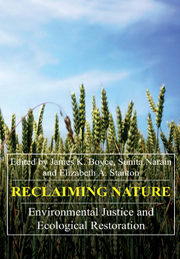Book contents
- Frontmatter
- Contents
- List of Figures and Tables
- Acknowledgements
- Introduction
- Part I ADDING VALUE
- Part II DEMOCRATIZING ACCESS
- Part III CAPTURING BENEFITS
- Part IV DEFENDING THE COMMONS
- 13 International Environmental Justice: Building the Natural Assets of the World's Poor
- 14 Environmental Justice: Reflections from the United States
- 15 Equitable Carbon Revenue Distribution under an International Emissions Trading Regime
- 16 Greenhouse Justice: An Entitlement Framework for Managing the Global Atmospheric Commons
- About the Contributors
- Index
13 - International Environmental Justice: Building the Natural Assets of the World's Poor
from Part IV - DEFENDING THE COMMONS
Published online by Cambridge University Press: 05 March 2012
- Frontmatter
- Contents
- List of Figures and Tables
- Acknowledgements
- Introduction
- Part I ADDING VALUE
- Part II DEMOCRATIZING ACCESS
- Part III CAPTURING BENEFITS
- Part IV DEFENDING THE COMMONS
- 13 International Environmental Justice: Building the Natural Assets of the World's Poor
- 14 Environmental Justice: Reflections from the United States
- 15 Equitable Carbon Revenue Distribution under an International Emissions Trading Regime
- 16 Greenhouse Justice: An Entitlement Framework for Managing the Global Atmospheric Commons
- About the Contributors
- Index
Summary
Introduction
Across the globe, vibrant social movements are emerging that link together issues of resource access, social security, environmental risks and disaster vulnerability. Although all people suffer the effects of pollution, global warming and resource exploitation, poor people are especially vulnerable since they live closer to the margin of survival and are less able to afford cushions from environmental ills. Moreover, as in the case of the United States described by Manuel Pastor in this volume, poor communities often face disproportionately heavy burdens from environmental degradation. Increasingly, low-income urban and rural communities around the world are organizing to fight for environmental justice — that is, for more equitable access to natural resources and environmental quality, including clean air and water. These new environmental movements connect sources and sinks; North and South; ecology and equity; and asset building and hazard vulnerability. They have begun to articulate new ideas about the quality of life, and the meaning of development and modernization.
There is mounting recognition that environmental pollution and natural resource degradation are not simply ‘quality of life’ issues primarily of concern to middle-class people of the global North. In cities of both the North and the South, residents of poor neighbourhoods often are most exposed to air fouled by car exhaust, diesel fumes, and deliberate and accidental industrial emissions. As urban growth accelerates worldwide, neighbourhoods struggle for access to green space, public transportation, sanitation, and clean water and air.
- Type
- Chapter
- Information
- Reclaiming NatureEnvironmental Justice and Ecological Restoration, pp. 327 - 350Publisher: Anthem PressPrint publication year: 2007
- 3
- Cited by



